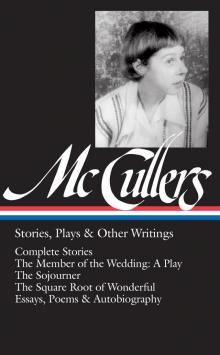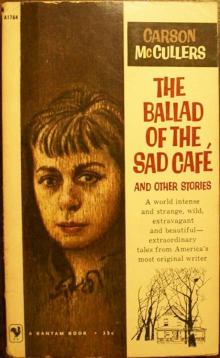- Home
- Carson McCullers
Carson McCullers - Reflections In A Golden Eye Page 9
Carson McCullers - Reflections In A Golden Eye Read online
Page 9
Now at midnight as she lay crying in the dark room another delusion came to her. She looked out of the window and saw again the shadow of a man on the Pendertons' back lawn. He was standing quite still, leaning against a pine tree. Then, as she watched him, he crossed the grass and went in by the back door. It came to her then with a fearful shock that this man, this skulker, was her own husband. He was sneaking in to Weldon Pendertons wife, even though Weldon himself was at home and working in his study. So great was her feeling of outrage that she did not stop to reason. Sick with anger she got out of bed and vomited in the bathroom. Then she put on a coat over her nightgown and stepped into a pair of shoes.
She did not hesitate on her way over the Pendertons'. Nor did she once ask herself what she, who hated scenes above all things, would do in the situation which she was about to precipitate. She went in by the front way and closed the door behind her noisily. The hall was half dark, as only a lamp was lighted in the sitting room. Breathing painfully she climbed the stairs. Leonora's door was open and she saw the silhouette of a man squatting by the bedside. She stepped inside the room and switched on the lamp in the corner.
The soldier blinked in the light. He put his hand to the window sill and half rose from his crouching position. Leonora stirred in her sleep, murmured, and turned over toward the wall. Alison stood in the doorway, her face white and twisted with amazement. Then without a word she backed out of the room.
In the meantime Captain Penderton had heard the front door open and close. He felt that something was amiss, but an instinct cautioned him to remain at his desk. He nibbled the eraser of his pencil and waited tensely. He had not known what to expect, but he was surprised when there was a knock on the door, and before he could reply Alison had come into the study.
'Why, whatever brings you here this time of the night?' the Captain asked with a nervous laugh.
She did not answer at once. She gathered the collar of her coat up close around her neck. When at last she spoke, her voice had a wooden tone, as if shock had deadened the vibrations. 'I think you had better go up to your wife's room,' she said.
This announcement, together with the strangeness of her appearance, startled the Captain greatly. But even stronger than his inward tumult was the thought that he must not lose his composure. In a flash a number of conflicting assumptions came to the Captain's mind. Her words could mean only one thing that Morris Langdon was in Leonora's room. But surely not, for they would hardly be so willy nilly as that! And if so what a position it would put him in! The Captain's smile was sugary and controlled. He did not reveal in any way his feelings of anger, doubt, and intense annoyance.
'Come, my dear,' he said in a motherly voice, 'you shouldn't be roaming around like this. I'll take you home.'
Alison gave the Captain a long piercing look. She seemed to be fitting together some mental puzzle. After a time she said slowly: 'You don't mean to sit there and tell me you know this and do nothing about it?'
Stubbornly the Captain retained his poise. 'I'll take you home,' he said. 'You're not yourself and you don't know what you're talking about.'
He got up hurriedly and took Alison by the arm. The feel of her frail, brittle elbow beneath the cloth of her coat repelled him. He hurried her down the steps and across the lawn. The front door of her house was open, but the Captain gave the doorbell a long ring. After a few moments Anacleto came into the hall, and before the Captain could make his departure he also saw Morris come out of his room at the top of the stairs. With mixed feelings of confusion and relief, he went back home, leaving Alison to explain herself as she chose.
The next morning Captain Penderton was not greatly surprised to learn that Alison Langdon had altogether lost her mind. By noon the whole post knew of this. (Her condition was referred to as a “nervous breakdown,” but no one was misled by this.) When the Captain and Leonora went over to offer their services, they found the Major standing outside the closed door of his wife's room, holding a towel over his arm. He had been standing there patiently almost all the day. His light colored eyes were wide with surprise and he kept twisting and mashing the flap of his ear. When he came down to see the Pendertons, he shook hands with them in a strangely formal fashion and blushed painfully.
With the exception of the doctor, Major Langdon kept the details of this tragedy a secret in his own shocked heart Alison did not tear up the sheets or foam at the mouth as he had imagined the insane to do. On coming into the house in her nightgown at one o'clock in the morning, she had simply said that not only did Leonora deceive her husband but that she deceived the Major as well, and with an enlisted man. Then Alison said that furthermore, she herself was going to get a divorce, and she added that as she had no money she would appreciate it if he, the Major, would lend her the sum of five hundred dollars at four per cent interest with Anacleto and Lieutenant Weincheck as guarantors. In answer to his startled questions, she said that she and Anacleto were going into some business together or would buy a prawn boat Anacleto had hauled her trunk into the room and all night he was busy packing under her supervision. They stopped off now and then to drink hot tea and study a map to decide where they would go. Sometime before dawn they settled on Moultrieville, South Carolina.
Major Langdon was greatly shaken. He stood in the corner of Alison's room for a long time and watched them pack. He dared not open his mouth. After a long time, when all that she had said had soaked into his mind and he was forced to acknowledge to himself that she was crazy, he took her nail scissors and the fire tongs out of the room. Then he went downstairs and sat at the kitchen table with a bottle of whiskey. He cried and sucked the salty tears from his wet mustache. Not only did he grieve for Alison's sake, but he felt ashamed, as though this were a reflection on his own respectability. The more he drank the more his misfortune seemed to him incomprehensible. Once he rolled his eyes up toward the ceiling and called out in the silent kitchen with a questioning roar of supplication:
'God? O God ?'
Again he banged his head on the table until a knot came out on his forehead. By six thirty in the morning he had finished more than a quart of whiskey. He took a shower, dressed, and telephoned Alison's doctor, who was a Colonel in the medical corps and the Major's own friend. Later another doctor was called in and they struck matches in front of Alison's nose and asked her various questions. It was during this examination that the Major had picked up the towel from the rack in her bathroom and put it over his arm. It gave him the look of being prepared for any emergency and was somehow a comfort to him. Before leaving, the Colonel talked for a long while, using the word 'psychology' many times, and the Major nodded dumbly at the end of every sentence. The doctor finished by advising that she be sent to a sanatorium as soon as possible.
'But look here,' the Major said helplessly. 'No strait jacket or any place like that. You understand where she can play the phonograph comfortable. You know what I mean.'
Within two days a place in Virginia had been chosen. Due to hurry the institution had been selected more because of the price (it was astonishingly expensive) than for the therapeutic reputation. Alison only listened bitterly when the plans were told to her. Anacleto, of course, was going also. A few days later the three of them left on the train.
This establishment in Virginia catered to patients who were both physically and mentally ill. And the diseases that attack the body and the brain simultaneously are of a special land. There were a number of old gentlemen who floundered about in a state of total confusion and had to keep a close watch on their unwieldy legs. There were a few lady morphinists and any number of rich young liquor heads. But the place had a pretty terrace where tea was served in the afternoon, the gardens were well kept, and the rooms furnished luxuriously; the Major was satisfied and rather proud that he could afford it.
Alison, however, made no comment just at first. Indeed she did not speak at all to her husband until they sat down to dinner that night. As an exception, on the evening of her arrival she
was to dine downstairs, but beginning with the next morning she was to rest in bed until the condition of her heart improved. At their table there were candles and hothouse roses. The service and the table linen were of the best quality.
Alison, however, seemed not to observe these niceties. On sitting down to the table she took in the room with one long, wandering gaze. Her eyes, dark and shrewd as always, examined the occupants at all the other tables. Then finally she spoke quietly and with bitter relish:
'My God, what a choice crew!'
Major Langdon was never to forget that dinner, for it was the last time he was with his wife. He left very early the next morning and stopped off to spend the night in Pinehurst where he had an old polo friend. Then, when he returned to the post a telegram was waiting for him. On the second night of her stay there Alison had had a heart attack and died.
This autumn Captain Penderton was thirty five years old. Despite his comparative youth he was soon to wear the maple leaves of a Major; and in the army, where promotion is largely contingent on seniority, this premature advancement was a marked tribute to his ability. The Captain had worked hard and his mind was brilliant from a military point of view it was the opinion of many officers, including the Captain himself, that he would one day be a high ranking General. Nevertheless, Captain Penderton showed the strain of his long efforts. This autumn, especially during the past few weeks, he seemed to have aged disproportionately. There were bruise like circles beneath his eyes and his complexion was of a yellow, mottled color. His teeth had begun to trouble him considerably. The dentist told him that two of the lower molars would have to be extracted and some bridgework put in, but the Captain kept deferring this operation, as he felt he did not have the time to spare. The Captain's face was habitually tense and a tic had developed in the muscles of his left eye. This spasmodic twitching of the eyelid gave to his drawn face a strangely paralyzed expression.
He was in a constant state of repressed agitation. His preoccupation with the soldier grew in him like a disease. As in cancer, when the cells unaccountably rebel and begin the insidious self multiplication that will ultimately destroy the body, so in his mind did the thoughts of the soldier grow out of all proportion to their normal sphere.
Sometimes with dismay he made a wondering resume of the steps that had brought about this condition beginning with the carelessly spilt coffee on a new pair of trousers, and continuing with the clearing of the woods, the encounter after the ride on Firebird, and the brief meetings on the streets of the post. How his annoyance could have grown to hate, and the hate to this diseased obsession, the Captain could not logically understand.
A peculiar reverie had taken hold of him. As he always had been keenly ambitious, he had often amused himself by anticipating his promotions far in advance. Thus, when he was still a young West Pointer the name and the title 'Colonel Weldon Penderton' had to him a familiar and pleasing sound. And during the past summer of this year he had imagined himself as a Corps Area Commander of great brilliance and power. Sometimes he had even whispered the words 'Major General Penderton' aloud to himself and it seemed to him he should have been born to the title, so well did the sound of it fit with his name. But now during the past weeks this idle dream had strangely reversed itself. One night or rather it was one thirty in the morning he had sat at his desk in a trauma of fatigue. Suddenly in the silent room three words had come unbidden to his tongue: 'Private Weldon Penderton.' And these words, with the associations they engendered, aroused in the Captain a perverse feeling of relief and satisfaction. Instead of dreaming of honor and rank, he now experienced a subtle pleasure in imagining himself as an enlisted man. In these phantasies he saw himself as a youth, a twin almost of the soldier whom he hated with a young, easy body that even the cheap uniform of a common soldier could not make ungraceful, with thick glossy hair and round eyes unshadowed by study and strain. The image of Private Williams wove itself through all these day dreams. And the background of all this was the barracks: the hubbub of young male voices, the genial loafing in the sun, the irresponsible shenanigans of camaraderie.
Captain Penderton had formed the habit of walking each afternoon before the quadrangle where Private Williams was quartered. Usually he saw the soldier sitting alone on the same bench. Walking on the sidewalk the Captain would pass within two yards of the soldier, and at his approach Private Williams would get up reluctantly and give a lazy salute. The days were growing short, and at this time in the late afternoon a hint of darkness was already in the air. For a brief period after sunset there was in the atmosphere a misty lavender glow.
The Captain on passing always looked full into the soldier's face and slowed his footsteps. He knew that the soldier must now realize that these afternoon walks were made on his account. It even occurred to the Captain to wonder why the soldier did not evade him and go elsewhere at this time. The fact that the soldier clung to his habit gave to these daily contacts a flavor of assignation that filled the Captain with excitement. After he had passed the soldier he had to suppress a craving to turn around, and as he walked away he felt his heart swell with a wild, nostalgic sadness which he could not control.
At the Captain's house there were a few changes. Major Langdon had attached himself to the Pendertons like a third member of the family, and this state of affairs was agreeable both to the Captain and Leonora. The Major was left quite stunned and helpless by the death of his wife. Even physically there was a difference in him. His jovial poise had deserted him, and when the three of them were sitting before the fire in the evening, he seemed to want to get himself into the most hobbledehoy and uncomfortable positions possible. He would twist his legs around each other like a contortionist or hike up one heavy shoulder while he mashed his ear. His thoughts and his words now centered entirely on Alison and the part of his life that had now come so abruptly to an end. He was inclined to make doleful platitudes concerning God, the soul, suffering, and death subjects the mention of which would hitherto have made his tongue grow thick and awkward with embarrassment. Leonora looked after him, fed him excellent dinners, and listened to any mournful observations he might have to make.
'If only Anacleto would come back,' he said often.
For Anacleto had left the sanatorium the morning after Alison had died and no one had heard of him since. He had repacked the luggage and put all of her things in order. Then he had simply disappeared. To replace him Leonora had hired for the Major one of Susie's brothers who could cook. For years the Major had longed for an ordinary colored boy who would maybe steal his liquor and leave dust under the rug, but who at any rate, by God, would not fiddle around with the piano and jabber in French. Susie's brother was a good boy; he played on a comb wrapped in toilet paper, got drunk, and cooked good cornbread. But at the same time the Major did not feel the satisfaction he had anticipated. He missed Anacleto in many ways and felt concerning him the most uncomfortable remorse.
'You know I used to devil Anacleto by describing what I would do to him if I could get him into the service. You don't suppose the little rascal really believed me, do you? I was mostly kidding him but in a way it always seemed to me that if he would enlist it would be the best thing in the world for him.'
The Captain was weary of the talk about Alison and Anacleto. It was a pity the nasty little Filipino hadn't been carried off by a heart attack also. The Captain was tired of almost everything around the house these days. The plain, heavy Southern meals that Leonora and Morris enjoyed were especially distasteful to him. The kitchen was filthy and Susie too slovenly for words. The Captain was a connoisseur of good food and a neat amateur chef. He appreciated the subtle cookery of New Orleans, and the delicate, balanced harmony of French food. Often in the old days he used to go into the kitchen when he was in the house alone and prepare for his own enjoyment some luscious tidbit. His favorite dish was fillet of beef a la Bearnaise. However, the Captain was a perfectionist and a crank; if the tournedos were too well done, or if the sauce got hot and cur
dled even the slightest bit he would take it all out to the back yard, dig a hole, and bury it. But now he had lost all appetite for food. This afternoon Leonora had gone to the movies and he sent Susie away. He had thought that he would like to cook something special. But in the midst of preparing a rissole he had suddenly lost all interest, left everything as it was, and walked out of the house.
'I can imagine Anacleto on K.P.,' Leonora said.
'Alison always thought I brought up the subject just to be cruel,' said the Major. 'But that wasn't so. Anacleto wouldn't have been happy in the army, no, but it might have made a man of him. Would have knocked all the nonsense out of him anyway. But what I mean is that in a way it always seemed to me terrible for a grown man twenty three years old to be dancing around to music and messing with water colors. In the army they would have run him ragged and he would have been miserable, but even that seems to me better than the other.'

 Carson McCullers
Carson McCullers Clock Without Hands
Clock Without Hands The Ballad of the Sad Cafe: And Other Stories
The Ballad of the Sad Cafe: And Other Stories The Member of the Wedding
The Member of the Wedding Collected Stories
Collected Stories The Ballad of the Sad Cafe
The Ballad of the Sad Cafe Reflections in a Golden Eye
Reflections in a Golden Eye The Heart Is a Lonely Hunter
The Heart Is a Lonely Hunter Carson McCullers - Reflections In A Golden Eye
Carson McCullers - Reflections In A Golden Eye Collected Stories of Carson McCullers
Collected Stories of Carson McCullers